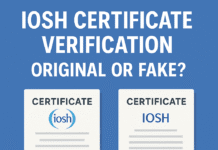
IOSH Safety Engineer Qualifications
Safety is paramount in any workplace, and the role of a qualified safety engineer cannot be overstated. In this article, we will delve into the world of IOSH Safety Engineer qualifications – what it takes to become one, the benefits of certification, and the impact it has on various industries.
I. Introduction
A. Brief overview of IOSH Safety Engineer qualifications
Becoming an IOSH Safety Engineer involves a rigorous process of education, training, and certification. This qualification is recognized globally, signifying a professional’s commitment to ensuring safety standards in the workplace.
B. Importance of safety engineering in various industries
Safety engineering is a critical component across industries, from construction to healthcare. IOSH Safety Engineers play a pivotal role in identifying and mitigating potential risks, ensuring a secure working environment.
II. What is IOSH?
A. Explanation of IOSH (Institution of Occupational Safety and Health)
The Institution of Occupational Safety and Health (IOSH) is a globally respected organization that promotes health and safety in the workplace. It sets the standards for safety management and provides guidance to professionals.
B. Role of IOSH in promoting workplace safety
IOSH actively works towards creating a safer working world by offering resources, training, and certifications. It collaborates with industry experts to develop best practices that enhance safety standards globally.
III. Becoming an IOSH Safety Engineer
A. Educational requirements
To embark on the journey of becoming an IOSH Safety Engineer, individuals typically need a relevant educational background in engineering, environmental science, or a related field.
B. Training programs and certifications
IOSH offers various training programs, each tailored to specific industries. Certifications range from entry-level to advanced, catering to professionals at different stages of their careers.
C. Experience and skills needed
In addition to formal education and certifications, practical experience and a specific set of skills, including risk assessment and communication, are crucial for aspiring IOSH Safety Engineers.
IV. Benefits of IOSH Safety Engineer Qualifications
A. Career opportunities
IOSH-certified professionals open doors to a wide array of career opportunities. Employers across industries value the expertise and commitment to safety that comes with IOSH qualifications.
B. Enhanced workplace safety
Companies benefit from having IOSH Safety Engineers on their teams, as they bring a comprehensive understanding of safety protocols, reducing accidents and creating a secure work environment.
C. Recognition in the industry
Achieving IOSH Safety Engineer qualifications not only enhances personal credibility but also brings recognition within the industry. Peers and employers alike acknowledge the commitment to safety standards.
V. IOSH Safety Engineer Training Programs
A. Overview of available training programs
IOSH provides a range of training programs, each designed to address specific safety challenges. From foundational courses to specialized training, professionals can choose programs that align with their career goals.
B. Specializations and advanced courses
For those looking to specialize, IOSH offers advanced courses catering to specific industries such as construction, healthcare, and manufacturing. These programs deepen expertise and open up niche career paths.
C. Online and offline training options
Flexibility is key in today’s fast-paced world. IOSH recognizes this by offering both online and offline training options, ensuring accessibility for professionals with diverse schedules and preferences.
VI. IOSH Safety Engineer Certification Process
A. Examination details
Becoming an IOSH Safety Engineer involves passing a comprehensive examination. The exam assesses knowledge, practical skills, and the ability to apply safety principles in real-world scenarios.
B. Renewal and maintenance of certification
IOSH certifications require periodic renewal to ensure professionals stay abreast of industry changes. This involves continuing education and staying engaged with evolving safety standards.
C. Continuous professional development
IOSH emphasizes continuous learning, encouraging professionals to engage in ongoing education and development to stay at the forefront of safety engineering practices.
VII. Job Roles and Responsibilities
A. Responsibilities of an IOSH Safety Engineer
IOSH Safety Engineers are tasked with identifying, assessing, and mitigating risks in the workplace. Their responsibilities include creating safety protocols, conducting inspections, and implementing corrective measures.
B. Industries hiring IOSH Safety Engineers
Various industries seek the expertise of IOSH Safety Engineers, including construction, manufacturing, healthcare, and energy. The demand for qualified safety professionals continues to grow across sectors.
C. Day-to-day tasks and challenges
The daily tasks of an IOSH Safety Engineer can vary, from conducting safety audits to providing training sessions. They must navigate challenges such as evolving regulations and emerging safety concerns.
VIII. Industry Recognition
A. IOSH Safety Engineer certifications recognized globally
One of the key advantages of IOSH qualifications is their global recognition. Professionals holding IOSH certifications are valued not only locally but also on an international scale.
B. Collaboration with other safety organizations
IOSH collaborates with other safety organizations to strengthen global safety standards. This collaborative approach ensures a unified effort towards creating safer working environments worldwide.
C. Importance of industry acknowledgment
Employers increasingly prioritize hiring professionals with recognized certifications. IOSH Safety Engineer qualifications provide a competitive edge in a crowded job market.
IOSH, or the Institution of Occupational Safety and Health, is a globally recognized professional body that offers various qualifications for safety professionals. To become a safety engineer with IOSH qualifications, individuals typically pursue the following steps:IOSH Managing Safely:
The IOSH Managing Safely course is a fundamental qualification that provides a broad understanding of key safety and health issues.
It covers essential topics such as risk assessment, hazard identification, accident investigation, and legal responsibilities.
IOSH Working Safely:
While not mandatory for safety engineers, the IOSH Working Safely course is an entry-level qualification that introduces basic principles of health and safety.
It is suitable for individuals at all levels and in all sectors to raise awareness about safety in the workplace.
IOSH Safety for Executives and Directors:
This course is designed for senior executives and directors to understand their legal responsibilities regarding health and safety.
It helps leaders integrate safety into business strategy and decision-making.
NEBOSH General Certificate:
The National Examination Board in Occupational Safety and Health (NEBOSH) General Certificate is a widely recognized qualification.
While not directly from IOSH, many safety professionals consider it valuable. It covers various aspects of occupational health and safety.
Professional Membership with IOSH:
After completing the relevant IOSH courses and gaining experience, individuals can apply for professional membership, such as Technician Member (TechIOSH) or Graduate Member (GradIOSH), depending on qualifications and experience.
Chartered Membership (CMIOSH):
The ultimate goal for many safety engineers is to achieve Chartered Membership of IOSH (CMIOSH).
This requires meeting specific criteria, including relevant qualifications, experience, and a commitment to continuous professional development.
Continuing Professional Development (CPD):
Safety engineers are encouraged to engage in ongoing learning and development to maintain their professional competence.
IOSH provides resources and support for CPD to ensure that safety engineers stay up-to-date with industry standards and best practices.
It's important to note that the exact requirements may vary, and individuals should check the latest information on the IOSH website or consult with IOSH directly to ensure they meet the current criteria for each qualification. Additionally, gaining practical experience in the field is crucial for becoming a competent safety engineer.IOSH Scholarship for Safety Professionals
IOSH Safety Manager: 50 Duties Of A IOSH Safety Manager
IOSH Safety Engineer: 50 Duties Of A IOSH Safety Engineer
IOSH Safety Officer: 50 Duties Of A IOSH Safety Officer
How to Check IOSH Accreditation
IX. Conclusion
A. Recap of key points
Becoming an IOSH Safety Engineer is a journey that involves education, training, and certification. The qualifications open doors to diverse career opportunities and contribute to the overall improvement of workplace safety.
B. Encouragement for those considering IOSH qualifications
For individuals contemplating a career in safety engineering, pursuing IOSH qualifications is a commendable step towards professional growth. The investment in education and certification pays off in numerous ways.
C. Final thoughts on the importance of safety engineering
Safety engineering is not just a profession; it’s a commitment to ensuring the well-being of individuals in the workplace. IOSH Safety Engineers play a crucial role in upholding and advancing safety standards globally.
X. FAQs
A. How long does it take to become an IOSH Safety Engineer?
The duration varies, but it typically takes several years of education, training, and experience to become a certified IOSH Safety Engineer.
B. Can I pursue IOSH qualifications online?
Yes, IOSH offers both online and offline training options to accommodate diverse schedules and preferences.
C. Are there specific industries that prefer IOSH-certified professionals?
IOSH-certified professionals are sought after in various industries, including construction, manufacturing, healthcare, and energy.
D. Is the IOSH certification recognized internationally?
Yes, IOSH Safety Engineer certifications are globally recognized, providing a competitive edge in the international job market.
E. What are the average salary expectations for IOSH Safety Engineers?
Salaries can vary based on experience, industry, and location, but IOSH-certified professionals generally command competitive salaries in the safety engineering field.
























